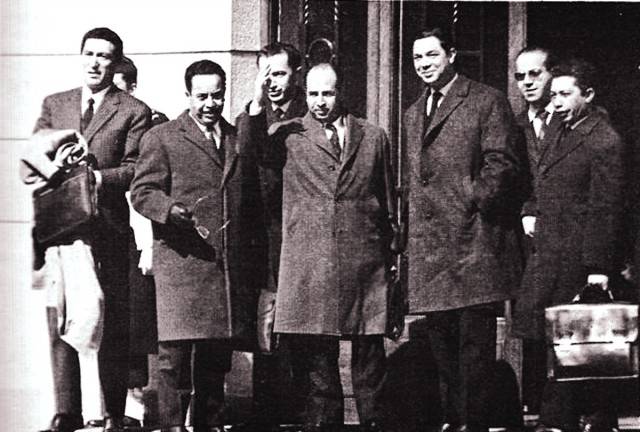
This photograph shows the Front de Libération Nationale (FLN) delegation shortly before the Évian Accords were finalized on 18 March 1962 in Évian-les-Bains, France, by France and the Provisional Government of the Algerian Republic, the government-in-exile of FLN, which sought Algeria’s independence from France.
The Accords ended the 1954–1962 Algerian War with a formal cease-fire proclaimed for 19 March and formalized the idea of a cooperative exchange between the two countries, as well as the full independence of Algeria from France.
In the FLN delegation from left to right: Taïeb Boulahrouf, Saâd Dahlab, Mohamed Seddik Benyahia, Krim Belkacem, Benmostefa Benaouda, Redha Malek, Lakhdar Bentobal, M’Hamed Yazid and Seghir Mostefaï.
The Évian Accords consisted of 93 pages of detailed agreements and arrangements. In essence these covered cease-fire arrangements, prisoner releases, the recognition of full sovereignty and right to self-determination of Algeria, in addition to guarantees of protection, non-discrimination and property rights for all Algerian citizens. A section dealing with military issues provided for the withdrawal of French forces over a period of two years, with the exception of those garrisoning the French military base of Mers El Kébir. Other provisions pledged that there would be no sanctions for any acts committed prior to the ceasefire.
French President Charles de Gaulle wanted to maintain French interests in the area, including industrial and commercial primacy and control over Saharan oil reserves. In addition, the European French community (the colon population), the pieds-noirs and indigenous Sephardi Jews in Algeria were guaranteed religious freedom and property rights as well as French citizenship with the option to choose between French and Algerian citizenship after three years. In exchange, Algeria received access to technical assistance and financial aid from the French government. Algerians were permitted to continue freely circulating between their country and France for work, although they would not have political rights equal to French citizens. The OAS right-wing movement opposed the negotiations through a series of bombings and an assassination attempt against De Gaulle at Clamart in Paris in August 1962.
The agreements included an article which stated that “Algeria concedes to France the use of certain air bases, terrains, sites and military installations which are necessary to it [France].” The agreement specifically permitted France to maintain its naval base at Mers El Kébir for another fifteen years and facilities for underground nuclear testing in the Sahara); France chose to withdraw from the base in 1967, however, only five years after the agreement.

The Accords ended the 1954–1962 Algerian War with a formal cease-fire proclaimed for 19 March and formalized the idea of a cooperative exchange between the two countries, as well as the full independence of Algeria from France.
In the FLN delegation from left to right: Taïeb Boulahrouf, Saâd Dahlab, Mohamed Seddik Benyahia, Krim Belkacem, Benmostefa Benaouda, Redha Malek, Lakhdar Bentobal, M’Hamed Yazid and Seghir Mostefaï.
The Évian Accords consisted of 93 pages of detailed agreements and arrangements. In essence these covered cease-fire arrangements, prisoner releases, the recognition of full sovereignty and right to self-determination of Algeria, in addition to guarantees of protection, non-discrimination and property rights for all Algerian citizens. A section dealing with military issues provided for the withdrawal of French forces over a period of two years, with the exception of those garrisoning the French military base of Mers El Kébir. Other provisions pledged that there would be no sanctions for any acts committed prior to the ceasefire.
French President Charles de Gaulle wanted to maintain French interests in the area, including industrial and commercial primacy and control over Saharan oil reserves. In addition, the European French community (the colon population), the pieds-noirs and indigenous Sephardi Jews in Algeria were guaranteed religious freedom and property rights as well as French citizenship with the option to choose between French and Algerian citizenship after three years. In exchange, Algeria received access to technical assistance and financial aid from the French government. Algerians were permitted to continue freely circulating between their country and France for work, although they would not have political rights equal to French citizens. The OAS right-wing movement opposed the negotiations through a series of bombings and an assassination attempt against De Gaulle at Clamart in Paris in August 1962.
The agreements included an article which stated that “Algeria concedes to France the use of certain air bases, terrains, sites and military installations which are necessary to it [France].” The agreement specifically permitted France to maintain its naval base at Mers El Kébir for another fifteen years and facilities for underground nuclear testing in the Sahara); France chose to withdraw from the base in 1967, however, only five years after the agreement.


